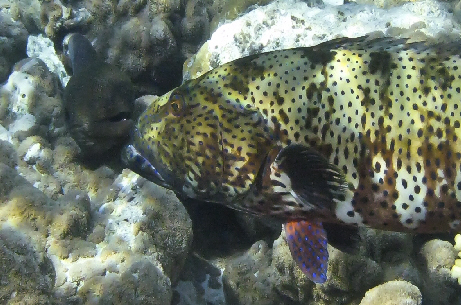
Alex Vail is researching the remarkable cooperation between moray eels and groupers.
Heard the one about the goldfish with the short memory? It is a commonly held belief that fish are the polar opposites to elephants. They always forget.
Alex Vail [2010] is, however, providing evidence this is not the case. He has observed that fish remember people, and is conducting field and aquaria research to show that they remember and communicate with other sea creatures to cooperate with them for mutual goals.
Vail, who grew up in a marine research centre on Australia’s Lizard Island where he was taught via Australia’s School of the Air, is researching the hunting behaviour of groupers and moray eels.
For his PhD, Vail is often based back on Lizard Island. He had initially planned to do all his research in the Red Sea, but he says that in the last five to six years the grouper population there has gone downhill very quickly due to overfishing. “It’s really sad. I went back last year and could snorkel for three hours and not see any grouper.”
“There are very few protected areas in the Red Sea, and even on really isolated reefs where you would think they might be safe from fishing, the groupers I want to study have all but disappeared.”
Vail has quite an interest in overfishing. Before he came to Cambridge, Vail canoed around Indonesia’s Togean Islands and won an award from Australian Geographic for his account of the trip. He had hoped to find evidence of local fishermen living sustainably in harmony with their environment, but instead he says there was a dearth of fish because they had been “hammered” by the local population. “There was nothing over 20-30 centimetres long left,” he says.” Even though there was no large scale fishing going on, they had managed to do a pretty good job of using up the fish. It was not sustainable.”
When it came to his PhD project, he has had to put a large focus on the Great Barrier Reef, where fish and coral reef biodiversity are protected. Here groupers and moray eels also help each other to hunt for food, as his co-supervisor Redouan Bshary first discovered in the Red Sea. The grouper chase the fish into the coral and then waggle their heads to show the eels where the fish they like to eat are hidden.
Vail says that groupers seem to be quite intelligent, or have good memories at the very least. “Groupers seem to remember snorkellers quite well for weeks. I saw a grouper on one occasion and fed it a couple of times. I didn’t get back to the same spot for three weeks and it sat on my fin waiting for food. Normally they don’t come that close. I think it knew I was bringing the food to it.”
Vail is now studying whether there are long-term relationships between individual morays and groupers; do groupers buddy-up with specific moray eels that are best at helping them hunt? For this question, he returned to the Red Sea this summer, as a grouper species there interacts most frequently with moray eels, and individuals can be easily identified via their spot patterns. He was working in collaboration with Elizabeth Tyler from King Abdullah’s University for Science and Technology, on a remote reef on the Farasan Banks, Saudi Arabia, where reports suggested the grouper population was still healthy.
Unfortunately even at this remote site, there was no longer enough of the key grouper species he needed to test his theory about the tight relationships between eels and groupers. Instead, he implanted eels with transmitters to allow him to track them down daily, and placed small video cameras in front of them to observe their behaviour. This revealed a range of interactions with other species that have never been reported, and which may shed light on the evolution of cooperative hunting. Vail will return to the more intact ecosystem on the Great Barrier Reef to pursue the grouper/eel relationship this winter. “It’s so sad,” he says. “The groupers are disappearing before we know half of what they do.”
Vail has spent most of his life swimming in the waters off Lizard Island, but he had never noticed the hunting behaviour of grouper. “It only became evident when I paid attention to it,” he said.
His goal is to raise public awareness about the intelligence of fish. “I want to show people how amazing and intelligent these fish are,” he says. “I want to excite people about the way nature works, to enthuse them so they will take a few seconds to consider the impact of the things they do on nature and how their actions could conserve the environment and make a difference.”












